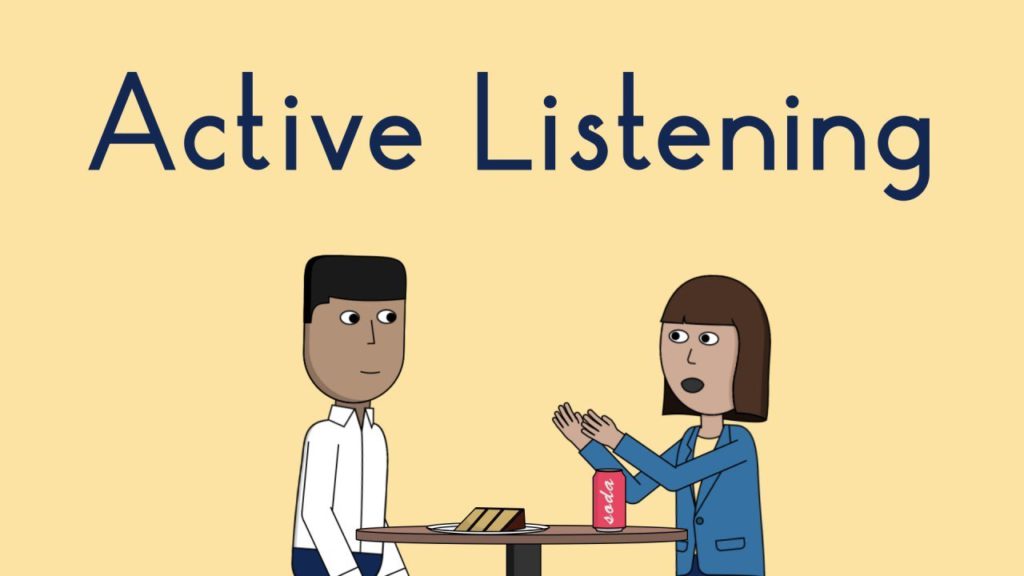
Listening is not something that just happens, listening is an active process in which a conscious decision is made to listen to and understand the messages of the speaker.Īctive listening is also about patience, listeners should not interrupt with questions or comments. Listening is the most fundamental component of communication skills. Verbal and non-verbal signs of active listening.In this article, we'll cover the following: You make a conscious effort to hear and understand the complete message being spoken, rather than just passively hearing the message of the speaker.
#Effective listening training how to#
With better control, we find it easier to put them aside and be fully prepared to listen to the other person rather than worrying about how to deal with our reactions and sensitivities.Īctive or effective listening is all about the other person and making them feel safe and comfortable sharing their thoughts, emotions, and ambitions with you.Active listening requires the listener to fully concentrate, understand, respond and then remember what is being said. What do you fear and what do you want or need?īuilding conscious knowledge of ourselves and our reactions gives us better understanding of them and better control over them. Be aware of your own emotions and responses in every situation you can. We get better at it and use less energy actively listening for the same benefit.Ī good starting point to improve your own effectively listening skills is to make time to listen to yourself. The good news is that like all skills, effective listening becomes easier with practice. Effectively listening is hard work which is why so many chose to remain average listeners. We have to actively commit to listening to others. So why do so few people improve their listening skills and become above average listeners?Įffective listening is a choice. Everyone one likes talking to those that truly listen to them. I personally love learning and figuring out solutions to problems and have found that developing my effective listening skills as a manager has been absolutely invaluable to become successful as a manager. You learn a huge amount through actively listening to team members and colleagues. Improving your effective listening skills, particularly as a manager, is one of the best time investments I can suggest you make.

To be effectively listening, you must keep the conversation focused on what the speaker is talking about, not what you want to talk about.įurther tips to improve your effective listening skills as a manager When they ask you questions or wait for you to contribute, keep your answers short and concise and then ask a question to get the speaker to continue with their subject.įinally, paraphrasing or repeating parts of the conversation and providing short summaries are further ways we can demonstrate to the speaker we are actively listening to what they are saying and taking it in. These questions are part of the natural back and forth of a conversation. These questions don’t divert the topic of conversation – they keep it on what the speaker is talking about. to guide the conversation while encouraging the speaker to continue.to ask for the speaker to expand on points made or provide different information so they can better understand the points being made.to demonstrate they are taking in what the speaker is saying and thinking about it.Those using effective listening skills at work ask relevant and open questions to These words or phrases are short so that we don’t interrupt their flow of thinking and speaking. Effective listening skills are underrated and under used by far too many people trying so hard to get their own message out.Ģ provide verbal feedback to demonstrate effective listening skillsĪgain, in the natural pauses or at the end of a point made, use short words of encouragement such as uha, yeah, of course, I understand, that makes sense. All essential elements in any relationship and as a manager, a massive part of your job is building and maintaining relationships. Listening is an essential skill to connect with others, to build rapport and to build trust. Using effective listening skills for managers is an exercise in exerting and increasing your influence on your team and the wider business.

How many times are you speaking but have the strong sense that the other person is just waiting for their turn to speak, not really taking in what you are saying. If you are speaking but no-one is listening – are you communicating? If you think about it, half of communication is how to listen effectively. In any business, ask the employees – what are the biggest problems – and communication is nearly always top of the list. If more of us used effective listening skills at work and outside work, we would improve the quality of our communication and relationships with others.


 0 kommentar(er)
0 kommentar(er)
